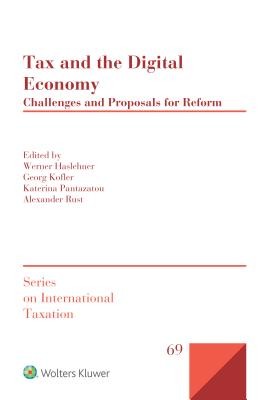
- We will send in 10–14 business days.
- Publisher: Kluwer Law International
- ISBN-10: 9403503610
- ISBN-13: 9789403503615
- Format: 16 x 24.9 x 2.5 cm, hardcover
- Language: English
- SAVE -10% with code: EXTRA
Tax and the Digital Economy (e-book) (used book) | bookbook.eu
Reviews
Description
The increasingly digitalized global economy is undermining the usefulness of many traditional tax concepts. In addition to issues of double taxation and double non-taxation, important questions arise concerning the allocation of taxing rights in respect of income from cross-border digital transactions. This is the first book to analyse what changes are possible, necessary and feasible in order to forestall the unravelling of the existing international tax framework.
Focusing in turn on the legal framework, specific proposals for adapting tax concepts for the digital economy, types of transactions and administrative issues such as those around data protection and digital currencies, the expert contributors discuss such challenges to taxation as the following:
- the pervasiveness of intangible assets;
- new value creation models;
- the ascendance of the sharing economy and digital services;
- virtual currencies;
- the importance of user participation for digital platforms;
- cloud computing;
- the impact of Big Data on tax enforcement;
- virtual business presence; and
- the influence of robotization.
Throughout, the authors describe and analyse proposals made by the Organisation for Economic Co-operation and Development (OECD), the European Union (EU) and individual countries and their likely impact going forward. They also attend to the limits imposed on reform possibilities by public international law, EU law and constitutional law.
It is generally acknowledged that there is a need to monitor how the digital transformation may be impacting value creation. This book is a key milestone toward developing a durable, long-term solution to the tax challenges posed by the digitalization of the economy. With its thorough scrutiny of proposals for digital services tax and virtual permanent establishments, insightful analysis of digital services and detailed description of the impact of big data on tax administration and taxpayer protection, it will quickly prove indispensable for tax practitioners and the international tax community more generally.
EXTRA 10 % discount with code: EXTRA
The promotion ends in 18d.04:57:19
The discount code is valid when purchasing from 10 €. Discounts do not stack.
- Publisher: Kluwer Law International
- ISBN-10: 9403503610
- ISBN-13: 9789403503615
- Format: 16 x 24.9 x 2.5 cm, hardcover
- Language: English English
The increasingly digitalized global economy is undermining the usefulness of many traditional tax concepts. In addition to issues of double taxation and double non-taxation, important questions arise concerning the allocation of taxing rights in respect of income from cross-border digital transactions. This is the first book to analyse what changes are possible, necessary and feasible in order to forestall the unravelling of the existing international tax framework.
Focusing in turn on the legal framework, specific proposals for adapting tax concepts for the digital economy, types of transactions and administrative issues such as those around data protection and digital currencies, the expert contributors discuss such challenges to taxation as the following:
- the pervasiveness of intangible assets;
- new value creation models;
- the ascendance of the sharing economy and digital services;
- virtual currencies;
- the importance of user participation for digital platforms;
- cloud computing;
- the impact of Big Data on tax enforcement;
- virtual business presence; and
- the influence of robotization.
Throughout, the authors describe and analyse proposals made by the Organisation for Economic Co-operation and Development (OECD), the European Union (EU) and individual countries and their likely impact going forward. They also attend to the limits imposed on reform possibilities by public international law, EU law and constitutional law.
It is generally acknowledged that there is a need to monitor how the digital transformation may be impacting value creation. This book is a key milestone toward developing a durable, long-term solution to the tax challenges posed by the digitalization of the economy. With its thorough scrutiny of proposals for digital services tax and virtual permanent establishments, insightful analysis of digital services and detailed description of the impact of big data on tax administration and taxpayer protection, it will quickly prove indispensable for tax practitioners and the international tax community more generally.


Reviews